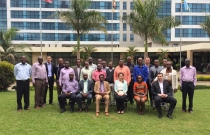Capacity Building Training Program for EATP - System Defense Plan in PSS/E
Eighteen engineers from the transmission system operators and power utilities in Ethiopia, Burundi, Kenya, Tanzania, Uganda and Rwanda participated in the PSS/E training and EATP Working Group meeting.
The training course was conceived as two training sessions, first part was about steady state remedial actions and the second part about under frequency load shedding, both of the most importance in system defense plan. System defense plan is a set of coordinated measures, which aim to maintain the integrity of the system in case of abnormal system conditions resulting from extreme contingencies.
On the first day, trainers presented technical recommendations and rules for manual and automatic actions to manage critical system conditions to prevent the power system from the loss of stability. After the morning break, trainers continued with static analyses, they presented advanced contingency analyses, multi-level AC contingency, tripping simulations and corrective remedial actions.
At the end of this session participants with the help of the trainers performed practical exercises in PSS/E, through 5 different test cases covering the most important remedial actions (generation dispatch, load shedding, topology changes and overload tripping simulations).
Day two started with the under frequency load shedding simulations in PSS/E. After the theoretical introduction about frequency stability, trainers presented recommendations and guidelines for implementation of the UFLS scheme in Continental Europe. During the rest of the day, the trainers presented modelling of different types of the under frequency load shedding relays. After this, participant with the help of the trainers modelled one type of UFLS relays for the test model.
The third day of the training started with the most interesting part for participants, the trainers presented under frequency load shedding simulations in PSS/E. The training session included: simulation of disturbances, running of the simulation and assessment of output results. After this, participant with the help of the trainers performed practical UFLS simulations on the test model throughout several different disturbances.

